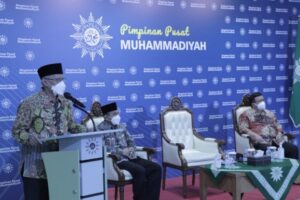Prof Dr H Haedar Nashir MSi signed a Memorandum of Understanding (MoU) between the Muhammadiyah Central Board and the Embassy of the Republic of Indonesia to Tokyo, Japan, on Friday (01/04). The Indonesian Ambassador to Japan, Ir Heri Akhmadi, attended virtually. The collaboration included educational training, collaborative research and education, the partnership between Muhammadiyah and related industries in Japan, and many other programs.
 Prof Haedar Nashir Prompts To Combating Extremism
Prof Haedar Nashir Prompts To Combating Extremism
Prof Haedar Nashir’s speech continued the signing procession through a Public Lecture presentation. Prof Haedar also mentioned three principles to actualize a sturdy and progressive nation, to implement Pancasila, religious and cultural principles. “Pancasila is Indonesia’s most appropriate foundation and ideology to be our orientation to develop. On the other hand, religion should be a divine inspiration and spiritual strength that has noble culture, Indonesian characters, and personalities,” he said.
Prof Haedar Nashir also mentioned three challenges of extremism amidst the impact of globalization, postmodernism, and the disruption era. First, anti-transformative extremism and all consequences. “This kind of extremism leads us to have old-fashioned (jumud) and myopic perspectives. It tends to withdraw amidst the change and become a reactive and separatist movement,” said Prof Haedar Nashir.
Second, extremism that follows massive transformation without filtering information achieved to liberal radical movement. Third, is the pragmatic extremism that allows radical changes as long as it benefits their groups. “This extremism may convert our national personalities,” he said. To conclude, Prof Haedar MSi highlighted that Indonesian people require the advancement to develop education competitiveness and quality but still need to lean on the national personalities to connect with its cultural and historical roots, comprising Pancasila, religious and cultural principles.